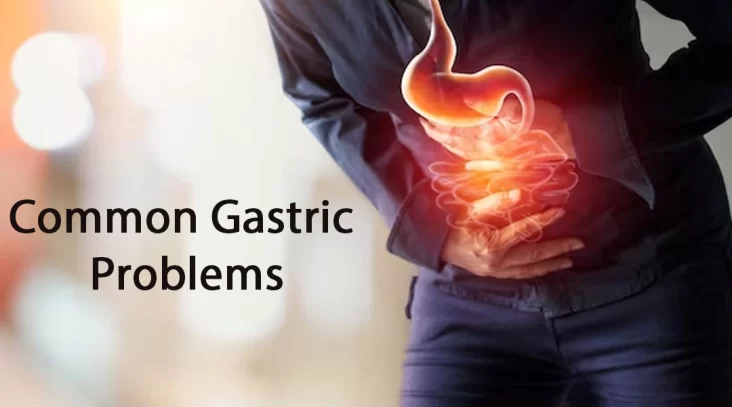Gastric problems encompass a range of conditions affecting the stomach and digestive system. These issues can lead to discomfort, pain, and disruptions in normal digestive function. Understanding the various common gastric problems, their causes, symptoms, and potential treatments is essential for managing and preventing these conditions.
The Various Common Gastric Problems, Their Causes, Symptoms, and Potential Treatments
Indigestion:
- Causes: Overeating, consuming spicy or fatty foods, stress, smoking, certain medications.
- Symptoms: Discomfort or pain in the upper abdomen, bloating, belching, nausea.
- Treatment: Dietary changes, antacids, avoiding triggers, managing stress.
Heartburn (Acid Reflux):
- Causes: Stomach acid flowing back into the oesophagus, often due to a weakened lower oesophagal sphincter (LES), obesity, pregnancy, and certain foods.
- Symptoms: Burning sensation in the chest, regurgitation of acid, sour taste in the mouth.
- Treatment: Lifestyle changes (elevating the head during sleep, avoiding trigger foods), antacids, acid-reducing medications.
Gastritis:
- Causes: Infection (usually Helicobacter pylori), chronic use of NSAIDs, excessive alcohol consumption, autoimmune diseases.
- Symptoms: Upper abdominal pain, nausea, vomiting, bloating, loss of appetite.
- Treatment: Antibiotics (if bacterial infection is present), acid-reducing medications, avoiding triggers.
Peptic Ulcers:
- Causes: Helicobacter pylori infection, long-term use of NSAIDs, excess stomach acid production.
- Symptoms: Burning stomach pain, bloating, nausea, vomiting, dark or bloody stools.
- Treatment: Antibiotics (if bacterial infection is present), acid-reducing medications, and lifestyle changes.
Gastroenteritis:
- Causes: Viral or bacterial infection from contaminated food or water.
- Symptoms: Diarrhea, vomiting, abdominal cramps, fever, dehydration.
- Treatment: Fluid replacement, rest, antidiarrheal medications (in some cases antibiotics).
Gastroesophageal Reflux Disease (GERD):
- Causes: Chronic weakening of the LES, obesity, hiatal hernia.
- Symptoms: Frequent heartburn, regurgitation, difficulty swallowing, chest pain.
- Treatment: Lifestyle changes (weight loss, dietary modifications), medications (antacids, proton pump inhibitors), in severe cases, surgery.
Irritable Bowel Syndrome (IBS):
- Causes: Not well understood, may involve a combination of factors like altered gut motility, visceral hypersensitivity, and inflammation.
- Symptoms: Abdominal pain, bloating, changes in bowel habits (diarrhoea, constipation), mucus in the stool.
- Treatment: Dietary changes (FODMAP diet), stress management, and medications to relieve symptoms (antispasmodics, laxatives).
Causes and Risk Factors of Gastric Problems
The causes of gastric problems can vary widely, but several common factors contribute:
Dietary Choices:
- Consuming large or heavy meals, spicy and fatty foods, and acidic or carbonated beverages can trigger gastric issues.
Medications:
- Certain medications, such as non-steroidal anti-inflammatory drugs (NSAIDs), can irritate the stomach lining and contribute to conditions like gastritis or peptic ulcers.
Infections:
- Bacterial infections, particularly by Helicobacter pylori, can lead to gastritis and peptic ulcers.
Lifestyle Factors:
- Smoking, excessive alcohol consumption, and high levels of stress can contribute to gastric problems.
Obesity:
- Excess weight can increase pressure on the abdomen, leading to conditions like GERD.
Genetics:
- Some individuals may be genetically predisposed to certain digestive conditions.
Hormonal Changes:
- Pregnancy and hormonal fluctuations can contribute to conditions like heartburn.
Symptoms of Gastric Problems
Gastric problems manifest through a variety of symptoms, and the severity can range from mild discomfort to debilitating pain. Common symptoms include:
- Abdominal pain or discomfort
- Bloating and gas
- Nausea and vomiting
- Changes in bowel habits (diarrhoea or constipation)
- Acid reflux and heartburn
- Loss of appetite
- Fatigue
- Unintentional weight loss
- Dark or bloody stools
Diagnosis of Gastric Problems:
Diagnosing gastric problems often involves a combination of medical history, physical examination, and diagnostic tests. Common diagnostic tools include:
Endoscopy:
- A thin, flexible tube with a camera is used to examine the oesophagus, stomach, and upper part of the small intestine.
Blood Tests:
- Blood tests can help identify infections, anaemia, or other abnormalities.
Stool Tests:
- Analyzing stool samples can provide information about infections, blood in the stool, or digestive enzyme deficiencies.
Imaging Studies:
- X-rays, CT scans, or MRIs may be used to visualize the digestive organs and identify structural abnormalities.
Gastric Problems Treatment:
Treatment for gastric problems depends on the specific condition diagnosed. General recommendations include:
Lifestyle Modifications:
- Dietary changes, such as avoiding trigger foods and practising portion control.
- Quitting smoking and moderating alcohol consumption.
- Managing stress through relaxation techniques.
Medications:
- Antacids to neutralize stomach acid.
- Proton pump inhibitors or H2 blockers reduce acid production.
- Antibiotics for bacterial infections.
- Medications to alleviate symptoms, such as antispasmodics for IBS.
Surgery:
- In severe cases, surgical intervention may be necessary. This can involve repairing hernias, removing damaged tissue, or reconstructing the LES.
Dietary Changes:
- Following a diet that suits the specific condition, such as a low-FODMAP diet for IBS or avoiding spicy foods for gastritis.
Probiotics:
- Probiotics may be recommended to promote a healthy balance of gut bacteria.
Prevention of Gastric Problems:
Preventing gastric problems involves adopting a healthy lifestyle and addressing risk factors:
Maintain a Healthy Diet:
- Eat a balanced diet with adequate fibre, and avoid excessive consumption of spicy, fatty, or acidic foods.
Stay Hydrated:
- Drinking enough water supports digestion and helps prevent constipation.
Manage Stress:
- Practice stress-reducing techniques such as meditation, yoga, or deep breathing exercises.
Limit Alcohol and Quit Smoking:
- Moderating alcohol intake and quitting smoking can benefit overall digestive health.
Use Medications Wisely:
- If prescribed medications, use them as directed and be aware of potential side effects.
Maintain a Healthy Weight:
- Achieving and maintaining a healthy weight reduces the risk of conditions like GERD.


One Comment
Pingback: Common Gastric Problems – Sujata Birla Hospital